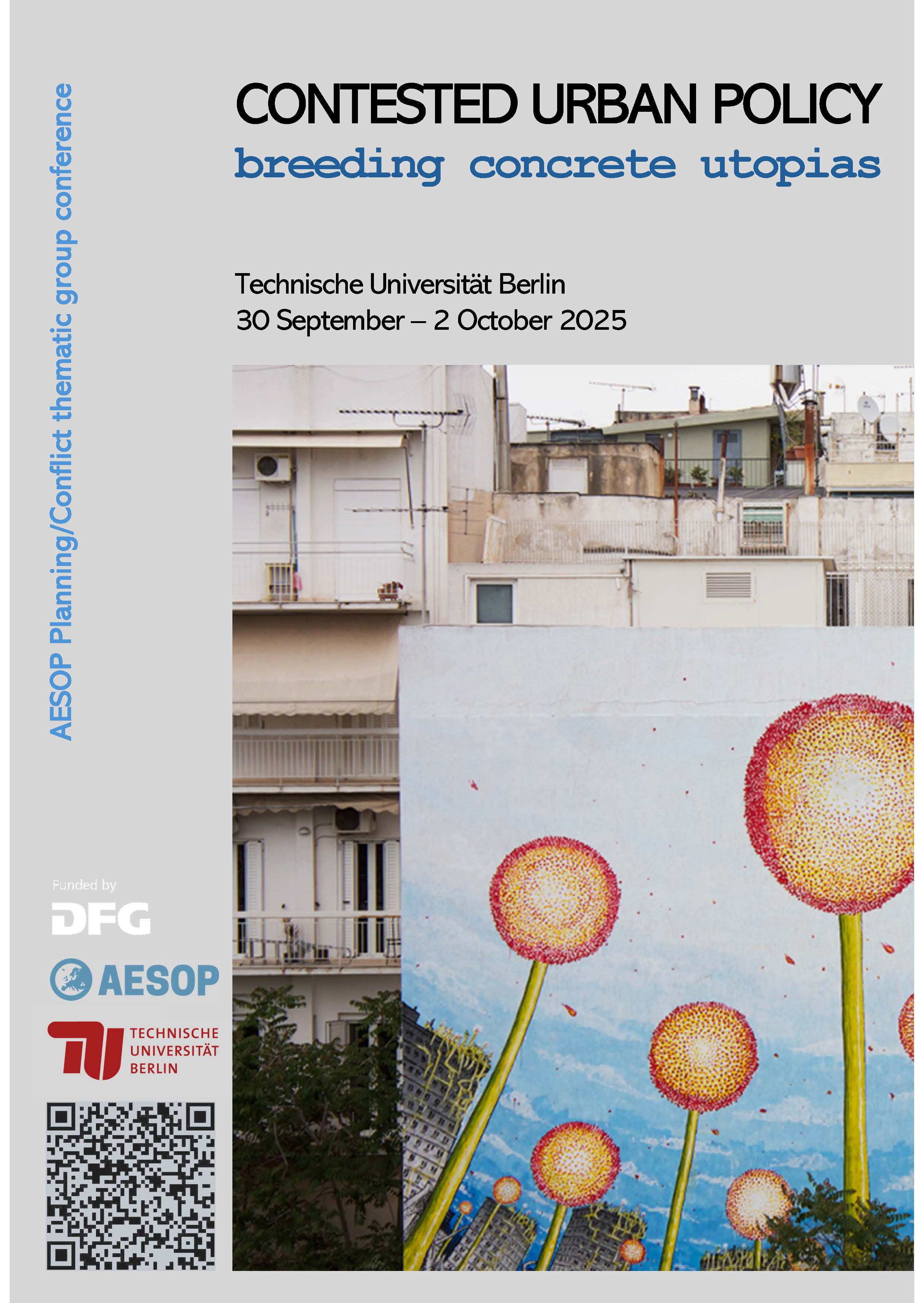What is the potential for urban policy conflicts to bring about change? In its fourth international conference, the AESOP Planning/Conflict TG pursues further its inquiry into the meaning and role of contention and conflict in democratic urban politics and planning. The conference focuses on emergent issues of contention and conflict in urban transformation, as well as the generative potential for change that may arise from alternative practices of contestation and mobilization.
This perspective invites exploring contention and conflict as possible drivers and opportunity structures for generating alternative futures. While this requires adopting a non-deterministic ontology of emergence, it also requires pushing our understanding of conflict beyond received schemes. Against reducing the radicality of contention and conflict to a matter of negotiated debate and manageable resolution – of ‘taming antagonism’ – as well as against reducing attention to reactive moments of protest and resistance. The conference invites papers that explore how conflict dynamics may be constitutive of capacities that bring about alternatives, papers that critically reflect on the conditions that hamper or enhance such change, and papers that analyze related practices that reinforce capacities to engage conflict and contention.
While radical democratic theory and critique of the ‘post-political city’ emphasize the need to recover the political as agonistic affirmation of difference, articulations of the debate also point to the variety of social sites and practices wherein this affirmation is possible.
Here, the idea of concrete utopia as a form of prefigurative action comes into play. As actualizations of possibilities not-yet-there intimately related to conditions and perceptions of the here-and-now, concrete utopias embody, at the same time, a critique of the present, an affirmation of its contingency, and a concretization of alternative aspirations and intentions. Their prefigurative nature resides in realizing a convergence of motivations and resources for local collective action that merges envisioning and enacting, i.e., the capacity of pre-figuration and of pre-formation, of imaging as well as making.
As an expression of insurgent practices, concrete utopias represent political moments in that they establish a link between the critical delegitimization of the present and the praxeological legitimation of alternatives. Just as conflict is a political moment marked by affirmation of the existence of an absence, of a gap, concrete utopias are political moments turning this affirmation into a capacity of envisioning and enacting alternatives.
The conference invites to adopt the idea of concrete utopia as a heuristic, exploratory hypothesis for critical research on urban policy conflicts. By discussing how prefigurative actions and concrete utopias are being experimented with in contemporary cities, the conference aims to contribute to exploring how the contestation of urban policies may produce seeds for political transformation.
Contributions are welcome that address contexts, conditions, and challenges for introducing change in a variety of urban domains of contestation – including, but not limited to work, care, housing, social autonomy and commoning, sustainability transitions, solidarity, and citizenship – both empirically and theoretically.
Call for papers:
Contributions are welcome that address contexts, conditions, and challenges for introducing change in a variety of urban domains of contestation – including, but not limited to work, care, housing, social autonomy and commoning, sustainability transitions, solidarity, and citizenship –both empirically and theoretically.
Submission of paper proposals:
Please submit your paper proposal including
- an abstract of 300-500 words, outlining its relation to the conference theme, conceptual framework and methodology
- three to five keywords
- a short bio-note of up to 100 words, including current affiliation, position and address
before 30 June 2025 to:
Upon completion of selection and registration, papers will be organized in thematic sessions and scheduled to form the final program.
Plans for special issues of international peer-reviewed journals will be discussed during the conference.
Key dates:
- abstract submission: 30 June 2025
- decision on paper proposals: 15 July 2025
- registration deadline: 15 August 2025
- final program: 1 September 2025
Preliminary program (t.b.c.):
- two keynote speeches:
Miguel A. Martinez, Uppsala Universitet and Nanke Verloo, Universiteit van Amsterdam
- thematic paper sessions
- field-trips to related sites in Berlin
The final program will be published before 1 September 2025.
Conference fee:
100 Euros / 50 Euros (students) to cover meals and refreshments, due to current budget cuts. Payment is requested together with registration before 15 August 2025. Receipt of payment is provided.
Concept and organization:
Chair of Planning Theory and Urban-Regional Policy Analysis, Technische Universität Berlin
Scientific committee:
Francesco Campagnari, EHESS Paris
Enrico Gualini, Technische Universität Berlin
Verena Lenna, Vrije Universiteit Brussels
Alessandra Manganelli, Universitat de Barcelona
Miguel A. Martinez, Uppsala Universitet
Stijn Oosterlynk, Universiteit Antwerpen
Carolina Pacchi, Politecnico di Milano
Nanke Verloo, Universiteit van Amsterdam
Venue:
Technische Universität Berlin, Building A
Straße des 17. Juni 153, 10623 Berlin
Contacts:
Conference link:
http://www.planningtheory.tu-berlin.de
AESOP Planning/Conflict thematic group link:
https://aesop-planning.eu/thematic-groups/planning-conflict
Open the call here:


